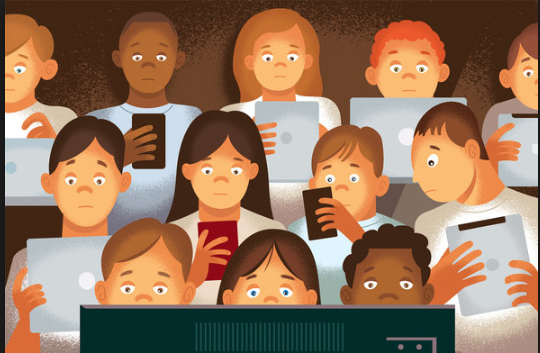Screen Psychology

February 7, 2019
How many hours do you spend on your phone? Researchers say that the average teenager spends NINE hours online every day! Phones are a huge part of people’s lives. Whether it’s social media letting people see and share what’s going on, or being able to find the answers to anything instantly. People are addicted to their phones for many reasons. This has huge impacts on people’s mental health. However, there are many ways that you can reduce the power your phone has over you.
Phones have been shown to have addictive qualities. When people’s phones are put away from them, research has shown people experience anxiety as a result of withdrawal. They also experience increased heart rate and sweat levels. Phones are addictive because of the thrill of using them. When using phones, people’s brains release a chemical called dopamine, which makes people happy. Additionally, many apps are designed to be addictive. For example, Instagram’s algorithm is designed to keep you on the app. When scrolling users experience a rush of content that makes them want to stay on the app for longer.
Additionally, cell phone usage has caused many mental health issues for people. Symptoms include increased stress, depression, and anxiety for many people. This is by the compulsivity of checking apps and messages your phone, which causes stress for people because they want to constantly be checking their phones. Anxiety can also be caused by people’s fear of missing out on important events. Since people can see what others are doing at all times on social media, fear of not knowing at all times causes anxiety.
Without a doubt, there are many things students can do to stop letting phones hang so heavy over their lives. First, it’s important to try to physically separate yourself from your phone. Research says that putting a phone across the room occasionally can help build physical and psychological barriers. In addition, finding other activities, like painting or reading, reduces addiction because it will prevent people from automatically turning to screen time when bored. Last, deleting or taking a break from addicting apps can alleviate both stress and addiction. Programs like Screen Time on Apple devices, can show how long users spend on their phones and on specific apps. Deleting or restricting these apps can help reduce addiction to your phone.
To conclude, cells phones and screens definitely impact people’s lives. Mental health and addiction are two major ways. However, there are many ways to lessen this impact. What choices will you make to have healthier screen habits?
Works Cited
Anderson, Jenny. “Even Teens Are Worried They Spend Too Much Time on Their Phones.” Quartz, Quartz, 23 Aug. 2018, qz.com/1367506/pew-research-teens-worried-they-spend-too-much-time-on-phones/.




